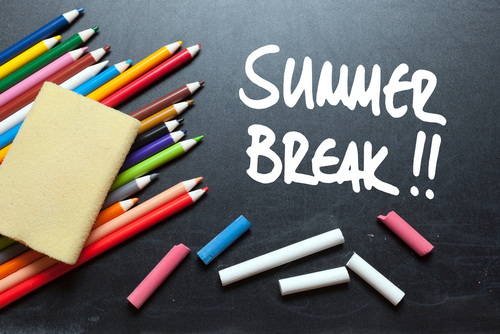-

As the school year comes to a close, parents and students look forward to a welcome change. No more homework or hectic mornings of making lunches, hunting down backpacks, polishing last minute assignments, or arguing over clothing selections. School break brings a new schedule, at least for a few days. Summer can find many parents frustrated by the number of hours their children are spending on computer games or social media, while others have their students booked in summer programs. But, for many, after a couple weeks of late nights and little sleep, constant eating, and a need to be entertained, parents are ready to send their students back to the classroom. What are some activities parents can consider over the summer to avoid the loss of key academic skills? Consider the following:
Elementary and Middle School Students
Elementary and middle school students (in fact, all students) can benefit from improving their reading skills. Find interesting books at grade level that your student will find exciting and develop incentives to get them reading. Read the book with them if necessary. Discuss the book with your student identifying key themes, characters, and plot elements. Reading comprehension skills are developed when students read. Those students who develop superior reading comprehension skills will see rewards on performance in all classes, standardized testing results, and success in future college studies. There is a direct correlation between scores in reading comprehension and the amount of reading a student does. Check out reading programs at your local libraries.
Practicing grade level math skills 20 – 30 minutes a day can keep a student from losing ground over the summer months. By the time your elementary student moves to middle school, they should have mastered addition, subtraction, multiplication, and long division with whole numbers, decimals, and fractions. They should know their multiplication facts up through the twelves. Many students cringe at the sight of math word problems; summer can be a great time to improve these skills. Middle school students will have mastered all basic math skills and pre-algebra skills. Some have mastered many of the algebra topics and are ready to prepare for a geometry course. There are many workbooks available by grade level at your local bookstore that you can purchase to help your student. Or, check out the math book that your student will be using in the upcoming year and begin previewing material.
If you have a budding artist, musician, athlete or actor, summer is a great time to further develop these skills. Find summer camps or groups that can keep your student involved and help further develop their skills. Club sports teams, art classes, and orchestras or music groups as well as local theater groups are great activities to keep your student busy and productive. Perhaps you can find motivational books about their area of passion that can help develop reading comprehension skills and expand their knowledge of the area of interest.
High School Students
Many high school students are busy with summer school classes as well as sports camps. Some travel around the country to participate in programs at many of the college campuses while others take on part-time jobs. Artists work on portfolios, musicians are practicing, and budding actors are performing in local plays. A large number of our high school students donate many hours over the summer to local charities to complete service commitments as well as scouting projects. Many students begin preparing for standardized tests such as the PSAT, SAT, or ACT (the summer before junior year is a great time to start) and incoming seniors start their college planning by drafting essays and beginning their applications.
As the summer closes, students must get ready for their classes and remember to complete summer assignments. Check local high school websites for assignments as teachers expect completed summer work as early as the first day of school! If a student is planning on a busy or a more difficult class schedule in the fall, summer months can be used to get a head start on their courses building confidence as well as setting a student up to make a great first impression with new teachers.
The Entire Family
Heading out of town on a vacation? Look for educational opportunities while traveling. Tour museums, historical landmarks, and local college campuses wherever you are visiting. It is never too early to tour college campuses so students can get some perspective on what different campuses look like. Especially, high school students. Check out small campuses, state universities as well as small and large private schools. Many college campuses run daily campus tours throughout the summer.
Find ways to connect with your children over the summer months when the schedule is less hectic. Read together, cook (a great place to practice fraction skills with younger students), play cards (number activity), play board games (many teach strategy), and donate time as a family to local charities. Help your children learn as many life skills as possible, including learning to do their own laundry, especially those heading off to college in the fall! Each student’s situation and needs are different. Balancing a student’s academic needs with rest, fun and family time is important. It is also important not to let a student lose ground academically over the summer months. Enjoy your time together as a family.
A Better Education, A Better Life
Serving Students across the United States!
susan@academics-etc.com
We are Looking Forward To Hearing From You and Helping Your Student!!
susan@academics-etc.com

